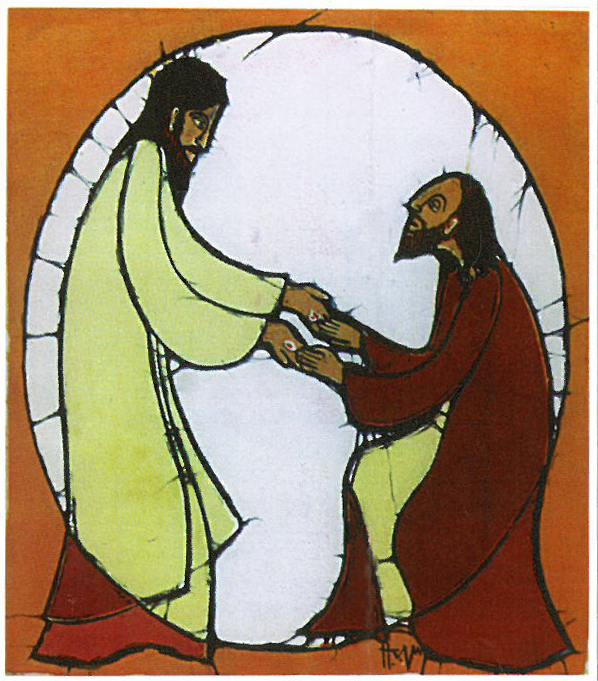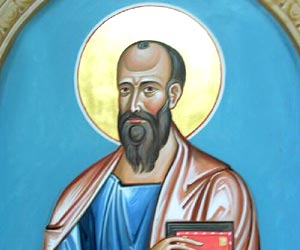 Finally, the last part of this long, five-part series. Our friend Annoyed Pinnoy continues,
Finally, the last part of this long, five-part series. Our friend Annoyed Pinnoy continues,
Now there are varieties of gifts, but the SAME Spirit; and there are varieties of service, but the SAME Lord; and there are varieties of activities, but it is the SAME God who empowers them all in everyone.- 1 Cor. 12:4-6
Notice how Paul uses the word “SAME” three times. Once for each person of the triad. Notice too that “gifts” (relating to the Spirit), “service” (relating to the Son) and “activities” (relating to Father God) refer generally to the same thing from different perspectives…
I understand how, in light of later speculations, how this would make people think Trinity, or at least trinity. I see this an rather an example of a NT-era oneness slogan, a way to emphasize the oneness of all Christians who at this time are scattered all over, and not united by any catholic network of bishops, as happened later. The meaning is: all Christians have received the same power from God; all Christians serve one Lord – Jesus; and all Christians worship one God. Same, same, same – but not hint of divine tripersonality. Rather, it’s pounding in the point that Christians are united by receiving one anointing, being saved by one Messiah, the risen Lord, and by acknowledging one and the same God – assumed, of course, to be Father. I agree completely, and think the point can’t be emphasized too often. (Here’s another such passage, one that doesn’t serve as “fool’s gold” for trinitarian readers.)
[Dale: The NT writers] all assume that this one who is our God and Father is also the God and Father of Jesus.
[Annoyed:] But that’s consistent with a Trinitarian understanding of the incarnation. If Christ eternally retains His human nature, then the Father will forever remain Jesus’ God from His human perspective.
Does Christ have a God over him, or not? They say that he does. We don’t ever see them qualifying this, or say that he has a god over him in one sense, but not in some other sense. The part of your text I put in bold – I don’t even know what that means. How could having a god over one be relative to a perspective?
Secondly, there are versions of Trinitarianism which allow for the Father being Jesus’ God on account of Jesus’ essential and/or personal generation from the unoriginate Father whom some term the fons deitatis/trinitatis. All the while affirming Christ’s full deity. If Jesus is truly God’s Son, then He must possess all the attributes of the nature of His Father. Therefore He must be God.
Problem: if the Father is the source of the Son, so that the Son exists because of the Father, then the Father exists a se, but the Son does not. And “full deity,” arguably, requires aseity. This is why many evangelicals, like Bill Craig, deny the “eternal generation” doctrine. The NT doesn’t support that anyway; the proof-texts are shockingly weak.
In response to my citing John 17:3, you cite 1 John 5:20, as saying that Jesus is “the true God.” We should indeed read the two together. Here’s the text:
And we know that the Son of God has come, and has given us understanding so that we may know Him who is true; and we are in Him who is true, in His Son Jesus Christ. This is the true God and eternal life.
Annoyed, who is “Him who is true” here? The Father, the one whose Son is Jesus. Now who does “This” refer to? “This” – whoever it is – is said to be “the true God.” Evidently, “Him who is true.” Who is being said to be “eternal life” here? Presumably, also the Father, God, the ultimate source of our eternal life. (v. 11 – “God has given us eternal life, and this life is in His Son”) You might think that because “This” immediately follows a mention of Jesus, that he’s still talking about Jesus. But in other cases in John’s writings, the “this” can refer back farther up to the subject at hand – and the most obvious subject here is “Him who is true” – God, not Jesus. Word-order is not as important in Greek as it is in English.
We can appeal to John 17:3 if we want to know who John calls “true God” – there, the Father is the one true God – so, consequently, no one else is. That’s what “only” or “the one” means.
 Similarly, if someone says that Barack is the one true president, we infer that speaker thinks that no one else is, no one who isn’t identical to Barack.
Similarly, if someone says that Barack is the one true president, we infer that speaker thinks that no one else is, no one who isn’t identical to Barack.
About 1 Corinthians 8,
Here Paul seems to make “gods” and “lords” equivalent. He gives no indication that for the pagans their pagan “gods” are higher than their pagan “lords.”
He has no need to indicate that; many commenters think that there is just a background, cultural assumption here of higher deities being “gods” and lower ones being “lords.” Which of course fits how Paul always treats Jesus as subject to, and obedient to God. (e.g. Philippians 2) And in this very text, if you think creation is in view, then the Father, God, is the ultimate source of all, and Jesus is the conduit through which the Father created all. So, God/the Father is the ultimate source of the cosmos, but Jesus is not, though he helped.
…Apostles continued the practice of the Septuagint of translating the tetragrammaton as kurios. Which means, whenever Jesus is referred to as “kurios” it may (depending on context) be identifying Jesus with Jehovah/Yahweh.
Associated, sure. But not identified. If you think the NT writers identify the Father and Son, you’re uncharitably attributing a ridiculous confusion to them, as they all think some things are true of the one, that aren’t true of the other. Again: we must assume, and must assume that they knew the indiscernibility of identicals. Annoyed, all the early Christians read that Jesus was being called ho kurios, but few to none inferred that he was the one God himself. See what I’ve written and podcasted here about Origen and Tertullian, a major examples. They are very clear that the Father is the one God, and that he’s greater, in various ways, than the Son.
Regarding John 20:28, Thomas calls Jesus “ho theos“ (the God).
As I understand this passage, he doesn’t. See what is linked here for a careful reading of that episode in the context of the whole book. In brief, Thomas’s is a double confession like in 1 Cor 8, of Jesus as the risen Lord, and of the one God who is working in and through him. If you think here that John is hinting that Jesus is God, he disabuses you of that confusion a few verses later, when he tells you the whole point:
…these have been written so that you may believe that Jesus is the Christ, the Son of God… (John 20:31a)
Son of. And notice the equation of the terms “Son of God” and “Christ.” “Son of God” here does not mean the later “God the Son.”
The Greek of Matt. 1:23 has “ho theos” and refers to Christ. That phrase is usually (though not exclusively) reserved for Almighty God in the New Testament.
Yes, Jesus can be called “God with us” or maybe better: “God is with us.” But a reader should know that the ancient practice of giving names with a God-word in them doesn’t imply that the recipient is God! Again, don’t try to out-smart Matthew. His thesis is crystal clear: 1:18, 16:16-17, 27:54. He’s not playing a game where he loudly says that Jesus is a man anointed by God, and then whispers off to one side that, oh yeah, he’s also God himself. He wouldn’t see those two claims as consistent; he was a Jew.
But Paul and other NT writers did quote the OT and repeatedly applied passages that use the tetragrammaton, and which clearly referred to the one true God (i.e. Almighty God), to Jesus. Why do that if Jesus isn’t fully God?
Because they saw something in Jesus’s life as another fulfillment of the passage in question. This obviously does not imply, and was never meant to hint that Jesus is the one who originally fulfilled it, the first time. Nor does it imply that Jesus has the same status as that one, that Jesus is “fully divine.” This is another confusion that has recently become popular, as people perversely try to decode the NT authors. The authors saw ho kurios in those places as referring originally to Yahweh, and in the second fulfillment, to “the Lord” Jesus, a new usage based on Psalm 110:1.
[Dale: on the ambiguity of “Lord”] (Nothing strange here; any name, term, or title can be equivocal – that is, can, in different contexts, refer to various beings.)
[Annoyed:] That’s true of titles, but ANY NAME? Really?
Yes, even personal names. I have known several called “Dave,” for instance. Yes, even divine names. It is well known that some ancient Jewish literature talked of a “lesser Yahweh” and had “Yahweh” give his name to or share in with various angels, men. And Justin Martyr thinks (mistakenly) there are two called “Yahweh” in the OT, one seen, the other not. Again, nothing strange here.
[Dale:] As with all the other NT authors, for Paul Jesus and God are one (in will, purpose, and rule) but they’re not the same.
[Annoyed:] “Not the same” in what sense? Not the same person? Trinitarians would agree. Not the same in nature? Not the same identical nature? But there’s evidence and reasons to believe all three persons share the same nature. Though, admittedly, it’s more difficult to substantiate that the same nature is the same identical nature. Hence, Nicene Monarchism [NM].
Not the same in the sense of not identical, not numerically one being. It follows that they are not the same person or self. It follows that they don’t have one “nature” if a nature is an individual, unshareable property. It doesn’t follow that they don’t share any universal nature. However, when the nature/essence we’re talking about is divinity/godhood, and we know that there’s exactly one god, and that this is the Father, then we know Jesus doesn’t also have that nature, because he is not the Father.
Here’s yet another place, for your consideration, where Paul identifies (not merely associates) the one God and the Father – 1 Timothy 1:
Paul, an apostle of Christ Jesus by the command of God our Savior and of Christ Jesus our hope, To Timothy, my loyal child in the faith: Grace, mercy, and peace from God the Father and Christ Jesus our Lord. …Christ Jesus came into the world to save sinners—of whom I am the foremost. But for that very reason I received mercy, so that in me, as the foremost, Jesus Christ might display the utmost patience, making me an example to those who would come to believe in him for eternal life. To the King of the ages, immortal, invisible, the only God, be honor and glory forever and ever.
Jesus was seen, so we know that that he’s saying the only God to be the Father. This is just reading. Same as with John 17:1-3. They could hardly be more clear.
I pass over the “Nicene Monarchism” you mention, because I’m still not sure what it is.
You conclude,
I think I’ve shown:
1. that the New Testament doesn’t conflict with one or more Trinitarian formulations.
2. that the New Testament is consistent with one or more Trinitarian formulations.
I also think the links I’ve provided to my other blogposts show that the Bible points towards something like Trinitarianism and conflicts with various types of Unitarianism.
Annoyed, you’re at most shown that the Bible implies your P1-P11 quoted in part 4. But you and I both know that they are too vague to imply any one clearly developed Trinity-theory, any clear interpretation of the old catholic formulas. But the issue isn’t: is there some Trinity-theory or other which is consistent with the NT. It is: should we, all things considered, read the NT as implying some Trinity-theory. You haven’t shown this, for your particular theory.
 And it will not be correct that the Bible “points towards” (?) “something like Trinitarianism” if I’m right that it every NT author teaches that the one God is the Father, because the Father ain’t the Trinity. So then, the whole NT will clearly imply that the one God isn’t the Trinity, contrary to any trinitarian theology. We should go with Paul, John, Peter, Mark, Luke, Mathew, and the rest, even against later catholic traditions. This is what Jesus, who picked out and taught these men, would have us do.
And it will not be correct that the Bible “points towards” (?) “something like Trinitarianism” if I’m right that it every NT author teaches that the one God is the Father, because the Father ain’t the Trinity. So then, the whole NT will clearly imply that the one God isn’t the Trinity, contrary to any trinitarian theology. We should go with Paul, John, Peter, Mark, Luke, Mathew, and the rest, even against later catholic traditions. This is what Jesus, who picked out and taught these men, would have us do.
Update: more dialogue re: worship of Jesus, etc. here.
And some arguing with the ever hot-headed Steve Hays here. (To save you some reading, an executive summary: I am a wicked apostate whose wickedness makes me constantly ignore the obvious, which is whatever Steve Hays asserts about the Trinity.)
